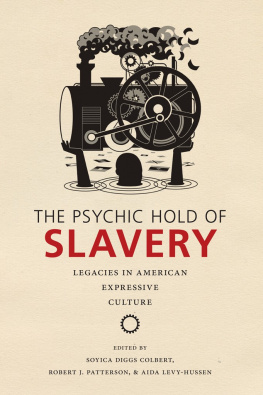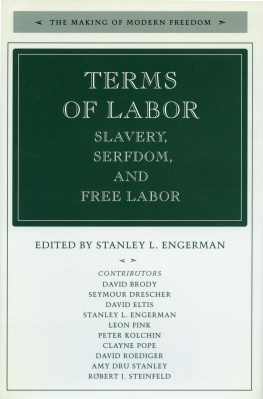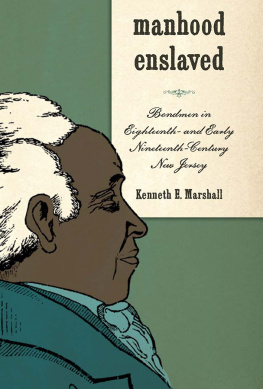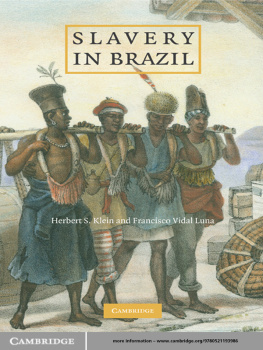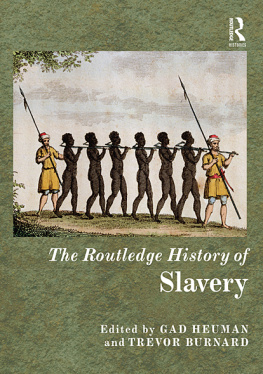Slavery and the University
Slavery and the University
HISTORIES AND LEGACIES
EDITED BY
Leslie M. Harris,
James T. Campbell &
Alfred L. Brophy

Published with generous support from Emory University
and the University of North CarolinaChapel Hill
2019 by the University of Georgia Press
Athens, Georgia 30602
www.ugapress.org
All rights reserved
Designed by Melissa Bugbee Buchanan
Set in 11/14 Garamond Premier Pro
Printed and bound by Thomson-Shore
The paper in this book meets the guidelines for
permanence and durability of the Committee on
Production Guidelines for Book Longevity of the
Council on Library Resources.
Most University of Georgia Press titles are
available from popular e-book vendors.
Printed in the United States of America
2221201918p54321
Library of Congress Control Number: 2018957953
ISBN: 9780820354439 (hardcover: alk. paper)
ISBN: 9780820354422 (paperback: alk. paper)
ISBN: 9780820354446 (ebook)
CONTENTS
James T. Campbell, Leslie M. Harris & Alfred L. Brophy
Craig Steven Wilder
Craig B. Hollander & Martha A. Sandweiss
Alfred L. Brophy
Jennifer Bridges Oast
Patrick C. Jamieson
A. James Fuller
Diane Windham Shaw
William B. Hart
Kabria Baumgartner
J. Brent Morris
Ruth J. Simmons
Sven Beckert, Balraj Gill, Jim Henle & Katherine May Stevens
Ywone D. Edwards-Ingram
Mark Auslander
Ellen Griffith Spears & James C. Hall
R. Owen Williams
Evelyn Brooks Higginbotham
ACKNOWLEDGMENTS
It has been a distinct privilege to work on this project. The essays herein represent only the beginning of a project that promises to help us all live more fully into the potential of higher education to change lives and communities. We are grateful for all who have participated in the work of creating a more honest history of slavery and higher education in the United States and beyond over the last few decades.
The 2011 Slavery and the University conference from which most of these essays are drawn brought together for the first time many people who had been laboring alone within their institutions as researchers, teachers, and administrators. The three days over which we were able to share our joys, triumphs, and disappointments in doing this work were critical to the histories told in this volume. For helping to bring that conference to fruition, wed like to thank Emory University, especially former president James Wagner and former provost Earl Lewis; Brown University, especially the Brown University Steering Committee on Slavery and Justice and former president Ruth Simmons; and the Ford Foundation, especially the late Alison Bernstein, who as program officer of the Education, Creativity, and Free Expression Program provided critical financial and intellectual support through the Difficult Dialogues Initiative.
The staff of the Transforming Community Project of Emory University attended to details large and small in the creation of the conference and in particular provided Leslie Harris with the support necessary to launch the first stage of this volume. We thank JoNell Usher, codirector; Melissa Sexton and Andrew Urban, TCP postdoctoral research fellows; Jyotsna Vanapalli, associate program administrator; and Arlene Robie, administrative assistant, for their commitment to this work. Our program committee, including the editors of this volume, the staff of the Transforming Community Project, and Susan Ashmore and Mark Auslander, were critical in setting a strong intellectual path for the conference. We thank all conference participants and audience members for their respectful and constructive work throughout the weekend.
As we came to the final months of the volume, Alex Trapps-Chabala and Sarah McCabe provided critical research support on the introduction. We are most grateful that Utz McKnight stepped in to assist Al Brophy in completing the final edits on his essay as Al recovered from a traumatic illness.
At the University of Georgia Press, Lisa Bayer, Walter Biggins, Melissa Bugbee Buchanan, Mary M. Hill, and Christina Cotter patiently and persistently nudged us to conclusion. We thank all of our essayists for their patience in a process that took much longer than we originally imagined.
Finally, we dedicate this volume to all who helped to create, willingly and unwillingly, a higher education system unmatched in its variety and in its openness to not only the U.S. but the global population. Even as we discuss and debate its merits and faults in the past and present, colleges and universities in the twenty-first century continue to press forward in providing pathways to greater equity for individuals and communities. May acknowledging the full truth of our complex past strengthen us further for the tasks ahead.
Slavery and the University
INTRODUCTION
James T. Campbell, Leslie M. Harris & Alfred L. Brophy
For more than a century now, students walking across McCorkle Place, the main quadrangle at the University of North Carolina, have passed in the shadow of Silent Sam, standing sentinel atop a tall granite pedestal. The statue, erected in 1913 with funding from the United Daughters of the Confederacy, honors soldiers who fought for southern independence, a group that included some 40 percent of UNCs 1860 student body. As several historians have shown, Silent Sam and the countless other common soldier monuments erected on campuses and courthouse lawns in the first decades of the twentieth century marked the climax of a long struggle over how the American Civil War would be remembered and represented, a struggle waged not on the battlefield but in school pageants and political campaigns, history textbooks and Hollywood films. In the version that prevailedthe version that still prevails in some quarters todaydisunion became a defense of constitutional principle and southern independence a romantic Lost Cause, while the war itself became a kind of unifying trial, the crucible of a truly united United States. Slavery, if it featured at all in such accounts, appeared only as an incident, an unfortunate but essentially benign institution for governing relations between two differently endowed races; while the years of Reconstruction, during which African Americans briefly exercised civil and political rights, became the Tragic Era, a baleful age of corruption and racial fanaticism mercifully cut short by southern Redemption.
Sam recently acquired new company on the quad. In 2005 the University of North Carolina unveiled the Unsung Founders Memorial in honor of the people of color, bound and free, who helped build the Carolina that we cherish today. Funded by a gift from the graduating class of 2002, the new memorial features a polished black granite tabletop upheld by the outstretched arms of hundreds of bronze figurines. What we do today will not rectify what our ancestors did in the past, declared James Moeser, UNC chancellor, in his speech at the dedication ceremony, but this memorial, I believe, attests to our commitment to shed light on the darker corners of our history. In keeping with that sentiment, the university library used the occasion to unveil a major
Though just a stones throw from one another, the two memorials conjure radically different pasts, a fact vividly expressed at their respective dedications. The tone of contrition and sober self-reflection at the 2005 ceremony was conspicuously absent at Sams dedication in 1913. The keynote speech on that occasion, delivered by Julian Shakespeare Carr, a local tobacco magnate, Confederate veteran, and UNC alumnus, was a paean to the Lost Causeto the honor and devotion of southern soldiers and the grand principle of local self government and State sovereignty for which they fought. Carr paid particular homage to UNCs student legions, whose courage and steadfastness, first in the war and later in the violent struggle against Reconstruction, had saved the very life of the Anglo-Saxon race in the South. He illustrated the point with a personal anecdote, recounting how, on his return to campus after Appomattox, he had horse-whipped a negro wench until her skirts hung in shreds after she publicly insulted and maligned a southern lady.
Next page

